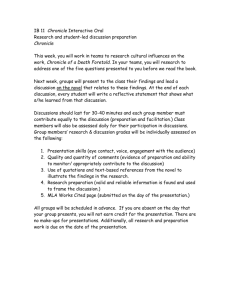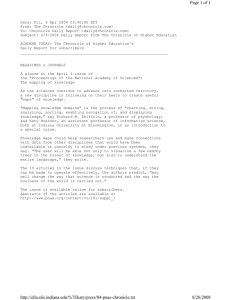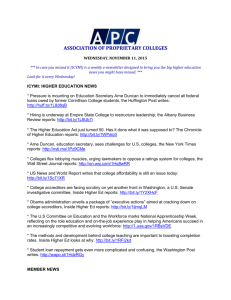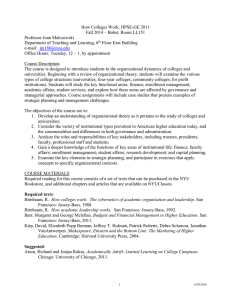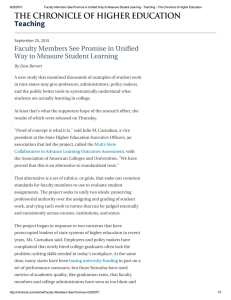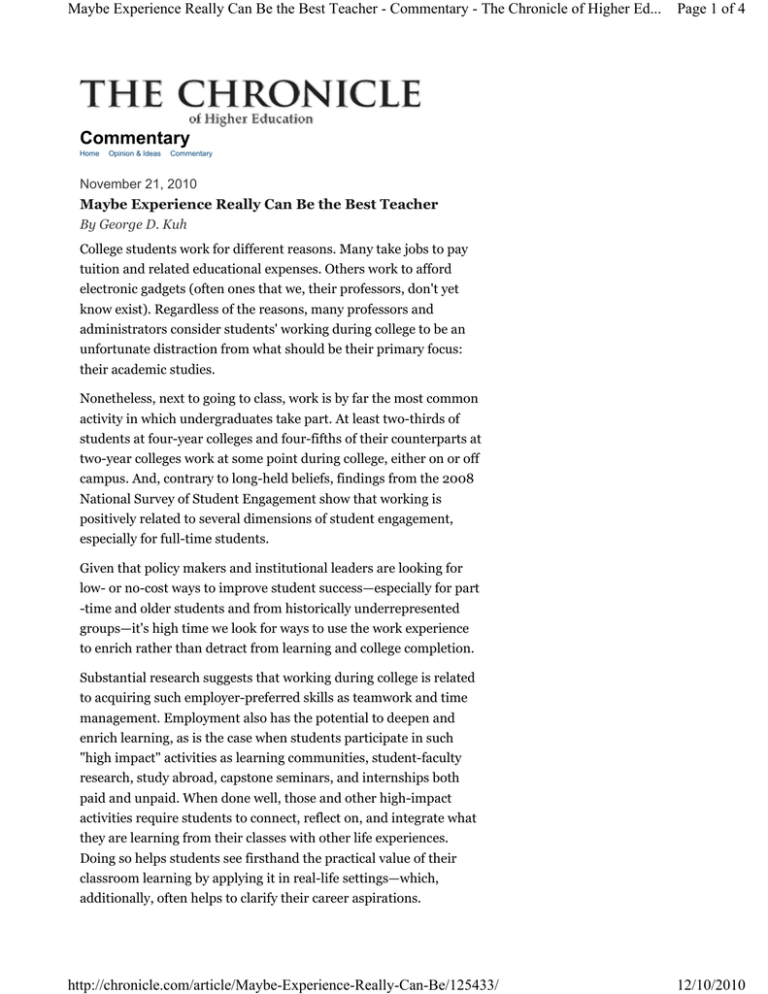
Maybe Experience Really Can Be the Best Teacher - Commentary - The Chronicle of Higher Ed...
Page 1 of 4
Commentary
Home
Opinion & Ideas
Commentary
November 21, 2010
Maybe Experience Really Can Be the Best Teacher
By George D. Kuh
College students work for different reasons. Many take jobs to pay
tuition and related educational expenses. Others work to afford
electronic gadgets (often ones that we, their professors, don't yet
know exist). Regardless of the reasons, many professors and
administrators consider students' working during college to be an
unfortunate distraction from what should be their primary focus:
their academic studies.
Nonetheless, next to going to class, work is by far the most common
activity in which undergraduates take part. At least two-thirds of
students at four-year colleges and four-fifths of their counterparts at
two-year colleges work at some point during college, either on or off
campus. And, contrary to long-held beliefs, findings from the 2008
National Survey of Student Engagement show that working is
positively related to several dimensions of student engagement,
especially for full-time students.
Given that policy makers and institutional leaders are looking for
low- or no-cost ways to improve student success—especially for part
-time and older students and from historically underrepresented
groups—it's high time we look for ways to use the work experience
to enrich rather than detract from learning and college completion.
Substantial research suggests that working during college is related
to acquiring such employer-preferred skills as teamwork and time
management. Employment also has the potential to deepen and
enrich learning, as is the case when students participate in such
"high impact" activities as learning communities, student-faculty
research, study abroad, capstone seminars, and internships both
paid and unpaid. When done well, those and other high-impact
activities require students to connect, reflect on, and integrate what
they are learning from their classes with other life experiences.
Doing so helps students see firsthand the practical value of their
classroom learning by applying it in real-life settings—which,
additionally, often helps to clarify their career aspirations.
http://chronicle.com/article/Maybe-Experience-Really-Can-Be/125433/
12/10/2010
Maybe Experience Really Can Be the Best Teacher - Commentary - The Chronicle of Higher Ed...
Page 2 of 4
For more than a century, integrating learning and work along with
service has been the mission of the seven federally recognized work
colleges in the United States: the College of the Ozarks and Alice
Lloyd, Berea, Blackburn, Ecclesia, Sterling, and Warren Wilson
Colleges. These institutions meet the eligibility criteria for funds
from the Work-Colleges Program administered by the U.S.
Department of Education, including featuring work, learning, and
service in their educational philosophy; requiring that all students
work at least five hours a week (though most students at work
colleges average between 10-15 hours); and making student
performance on the job as well as the classroom part of the student
record. The goal is to help students learn to balance study, service to
others, and the demands of their jobs.
Other institutions are pursuing similar ends. The University of
Maine at Farmington has created more on-campus jobs to help
students see the connections between curriculum and work.
Boston's Northeastern University and the University of Waterloo, in
Ontario, offer large numbers of high-quality off-campus internships.
As part of a two-day visit to the University of Iowa in 2009, I
encouraged staff members in the division of student services to
teach their student employees to connect and apply what they were
learning in class to their jobs, and vice versa. They subsequently
started a small pilot program with students working in different
kinds of jobs—clerking at the campus bookstore, assisting at the
health center, and answering questions at the residence-hall
information desk, to name just a few.
Supervisors met with their student employees twice during the
semester. To focus those conversations, they provided students with
a list of questions in advance:
• How is this job fitting in with your academics?
• What are you learning here at work that is helping you in class?
• What are you learning in class that you can apply here at work?
Although only about
half of the 33
• Can you give a couple of examples of what you are learning here at work that you will use in
your chosen profession?
students who had the structured meetings with their supervisors
responded, the results of the survey comparing them with 373 coworkers who did not have such meetings were striking. On virtually
every measure, the pilot-program group was much more positive.
For example, about 70 percent of the students in the pilot program
agreed that they had made connections between their work
experience and their major-field course work, compared with only
http://chronicle.com/article/Maybe-Experience-Really-Can-Be/125433/
12/10/2010
Maybe Experience Really Can Be the Best Teacher - Commentary - The Chronicle of Higher Ed...
Page 3 of 4
29 percent of their co-workers. Sixty-nine percent of the pilotprogram workers reported that their work had helped improve their
written communication skills, compared with 17 percent of their
peers. Seventy-seven percent of the pilot-program workers said
their jobs had helped them use critical-thinking skills to solve
problems, compared with 56 percent of the others.
Iowa is expanding the program this year, making an effort to
include more students working in areas such as food service, where
integrating academic learning with the work experience may be
more challenging. Any college can adapt this generic, low-cost,
potentially high-payoff approach.
For students in off-campus jobs, a classroom-based model can
achieve similar ends. Professors can create assignments that
encourage such students to make connections between course
materials and their jobs, and can lead discussions that ask students
to reflect on and integrate their learning. For example, in an upperdivision writing course, a professor could ask students to analyze, in
a genre appropriate for the field, the relevance of key concepts
presented in class readings to one's workplace, or to dealing
effectively with a low-performing co-worker.
Getting students to talk, in the company of their peers, about how
they are applying their learning can be a significant challenge. One
way to jump-start meaningful exchanges is to include in the class an
upper-division student who is articulate in such matters. After a few
sessions, students will very likely begin making and discussing
connections themselves.
Not every course needs to be so structured for students to derive
benefits from connecting learning and work. If working students
have just one or two such courses in the first year, and again a few
more times in the major, they would begin to develop an enhanced,
practiced capacity for reflection and integration that they can use in
other classes and settings.
So how can colleges build on those successes? One way is for a
consortium of colleges and universities to seek funds to develop
course modules focused on connecting learning and employment.
The challenges and rewards of using work to educational advantage
could then be documented and adapted by colleges with large
numbers of working students.
There are many good ideas for enhancing college achievement and
helping more undergraduates succeed. Few promise to deliver as
http://chronicle.com/article/Maybe-Experience-Really-Can-Be/125433/
12/10/2010
Maybe Experience Really Can Be the Best Teacher - Commentary - The Chronicle of Higher Ed...
Page 4 of 4
much bang for the buck as making work more relevant to learning,
and vice versa.
George D. Kuh is director of the National Institute for Learning
Outcomes Assessment, located at Indiana University at
Bloomington and the University of Illinois at Urbana-Champaign.
He is a professor emeritus of higher education at Indiana
University and author of High Impact Practices: What They Are,
Who Has Access to Them, and Why They Matter (AAC&U, 2008).
Copyright 2010. All rights reserved.
The Chronicle of Higher Education 1255 Twenty-Third St, N.W. Washington, D.C. 20037
http://chronicle.com/article/Maybe-Experience-Really-Can-Be/125433/
12/10/2010

